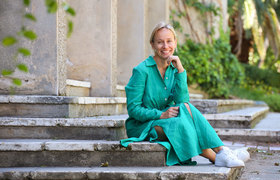Policy action essential to care for SA’s growing number of older people
26 April 2023 | Story Niémah Davids. Photo Pexels. Read time 6 min.
Addressing the gaps for long-term care of older people in southern Africa is critical for their well-being and that of their caregivers. And it requires mobilisation from government, civil society and academia to lead policy development and implementation processes to support this overlooked sector of society.
This was according to Dr Gabrielle Kelly, co-lead on the University of Cape Town (UCT)-led Family Care of Older Persons in Southern Africa Programme. Dr Kelly is a senior research associate at the Samson Institute for Ageing Research (SIFAR) – a UCT partner institution.
The Family Care of Older Persons in Southern Africa Programme is led by Associate Professor Elena Moore in UCT’S Department of Sociology and aims to explore and provide a better understanding of the meaning of family care for older people in southern Africa. As part of this work, Kelly has now released new research in a policy brief titled: “Addressing the gaps in long-term care for older people in southern Africa.” This work is based on an article co-written by the University of Botswana’s Dr Miriam Sebego and recently published in the International Journal of Care and Caring, as part of a special issue on Family Care for Older Persons in Southern Africa.
Niémah Davids (ND): While reviewing current literature out there on caring for older people in South Africa, tell us what you’ve discovered.
Gabrielle Kelly (GK): There’s definitely a lack of research on long-term care for older people in the region. It’s for this reason that this policy brief highlights the research gaps, as well as their potential impact on public awareness, policy development, funding, and programming in this sector. This policy brief proposes a set of key policy actions and a research agenda to strengthen the care methods for older people going forward.
ND: Before we delve into your research findings, tell us about some of the research methods used during this study.
GK: To gather evidence to inform this brief, we conducted a scoping review of the existing peer-reviewed and grey literature on long-term care for older people in several southern African countries, including Angola, Botswana, Eswatini, Lesotho, Malawi, Mozambique, Namibia, South Africa, Zambia, and Zimbabwe. We systematically searched, screened, and analysed texts using internationally accepted guidelines for scoping reviews. A total of 77 sources were included in the review, based on the publication date, focus, context and geographical location.
ND: What were some of your key findings?
GK: Let’s start with the fact that there’s a dearth of data available that focuses on how caregivers experience caring for older people. While most care for older people in the region is provided by family members, very little research has been conducted on the experiences, capabilities, and support needs of this group of people. In South Africa, several studies have focused on the experiences of those caring for people with Alzheimer’s and dementia, primarily in middle-income groups, and the findings show that caregivers face significant stressors and trade-offs. However, there is little focus on the practices of providing this or other kinds of care, and the experiences of caregivers in low-income households are largely overlooked.
“Our research also highlights the lack of progress in developing appropriate systems and structures to support long-term care in family, community and residential facilities in the region.”
Our research also highlights the lack of progress in developing appropriate systems and structures to support long-term care in family, community, and residential facilities in the region. Most care for older people is undertaken by family caregivers with little to no external support.
It is clear from our research that developing and implementing policies and systems around long-term care for older people has been neglected in southern Africa, given competing priorities and a clear normative preference for family and community-based care. This means that governments are taking very little responsibility for supporting care facilities in informal settings and are also failing to adequately bolster families’ capacity to provide care.
ND: What are some of the implications of these findings?
GK: The structures and practices of caring for older people are not areas that have attracted significant research attention or funding. And the lack of evidence limits opportunities to make care issues more visible to government, as well as other sectors through advocacy, or to strengthen the case for care interventions in the region.
The lack of data on care needs and existing capacity for care provision across both the formal and informal care sector, constrains forecasting, planning and budgeting for an ageing population, and limits the development of evidence-based policies and appropriate interventions or community-based services to assist caregivers and older people in need of care.
ND: How do we address gaps that exist when it comes to long-term care for older people in southern Africa?
GK: We absolutely must prioritise long-term care for older people in national health, social protection and care systems, as well as development planning. We need to develop policies and systems that support long-term care in family, community and residential facilities and recognise the importance of family caregiving. We need to train and develop care workers to support their well-being and recognise them as essential workers.
“These efforts would help to ensure that older people and caregivers receive the necessary support to maintain their basic rights, fundamental freedoms and human dignity.”
Addressing these gaps is critical if we want to prioritise the needs of older people and their caregivers. And by prioritising long-term care for older people and investing in research, countries can develop and implement effective, culturally relevant and context-specific care models. These efforts would help to ensure that older people and caregivers receive the necessary support to maintain their basic rights, fundamental freedoms and human dignity.
 This work is licensed under a Creative Commons Attribution-NoDerivatives 4.0 International License.
This work is licensed under a Creative Commons Attribution-NoDerivatives 4.0 International License.
Please view the republishing articles page for more information.










